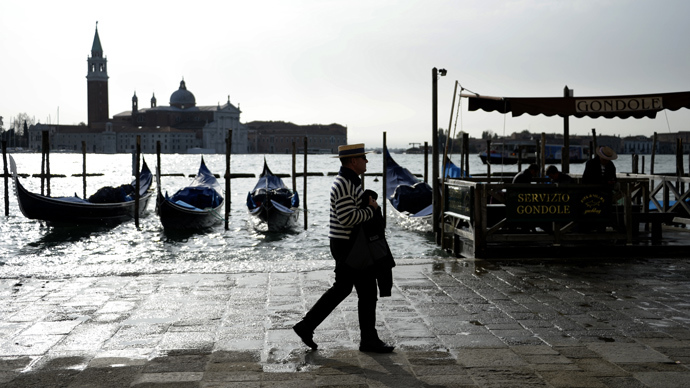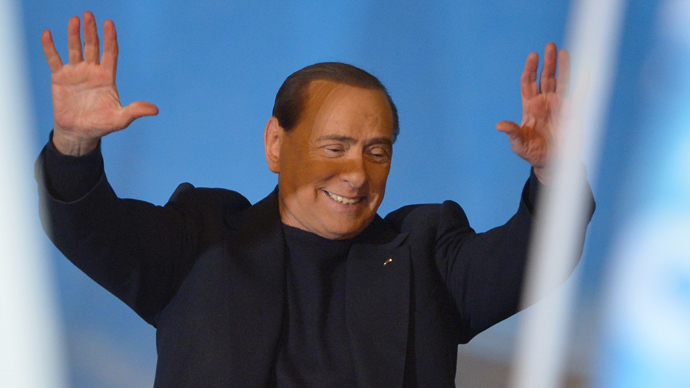Pitchfork and pizzas - the death of Italian dolce vita

Italy is renowned for lousy government and vast government debt all wrapped in the most stylish of facades. Until relatively recently, the dolce vita seemed as unstoppable as the passion invested in everything from Fellini films to Scuderia Ferrari.
Thanks to being the headquarters of Fiat, Turin draws parallels with Detroit. As a genuine 'MoTown,' there is a correlation. However, even in economic health, Detroit was a pale shadow of the dynamic cultural city at the foot of the Alps. More recently celebrated as the birthplace of the slow food movement. In historic Turin, you can drink a marocchino in the delightful period cafes where Camilo Cavour plotted the Risorgimento, unifying Italians from Piedmont to Sicily.
Recently, a disparate group have found themselves protesting in a direction of travel which may be precisely opposite to Cavour's unifying spirit.
Sicilian farmers’ fed up with taxes, unions and the vast Italian bureaucracy began the “pitchfork” protests in 2011. Now the “forconi” represent an odd coalition ranging from lorry drivers and small businessmen to anti-globalization protesters, northern secessionists and far right groups.
Italian anger has been exacerbated by continual national stagnation: 12% unemployment overall, 40% for under 25’s, debt-GDP over 125%, a real economy no larger than 2001. Italy maintained a sense of dolce vita throughout the post war era, extending ancient Rome’s "panem et circenses” (‘bread and games’) politics, despite tangible Communist opposition, Red Brigade terrorism, a strong mafia et al, while a corrupt inefficient state nexus over-spent lavishly, running up debts, entitling a bloated trades’ union hierarchy with unsustainable perks.

Consequently, Italy is in danger of tearing itself apart. Nevertheless, the nation is rich in creativity and resplendent in vast swathes of entrepreneurs. Ranged against the progressive forces for growth is the clunking bureaucracy where everything is subject to multiple duties - and corruption can be endemic. Rich and poor alike, Italians find themselves sentenced to a crazy Machiavellian lifestyle, forced to circumnavigate a bureaucracy it is essentially impossible to comply with. Unions have ensured employment laws so rigorous that new full-time jobs in small businesses are rare as employers simply cannot comply with the weight of regulations. Instead many Italians have long been forced to juggle several part time jobs.
The last mandate for change was handed to colorful self-made billionaire Silvio Berlusconi who promised upwards mobility and an economic boom.
Overall, he delivered next to nothing.
Well, in terms of political reform, anyway. There was a modicum of upward mobility but that seemed to focus, curiously, on dental hygienists amongst other niche occupations, largely staffed by women. A charitable soul might suggest Mr Berlusconi was doing his bit for female emancipation. Overall, Italy overall continued to stagnate.
Italian MPs are the highest paid in Europe, averaging circa $21,000 per month (!), with vast pensions. The government has now abolished state funding for political parties but that is barely a drop in the ocean compared to the lavish perks enjoyed by Italy’s political class whose benefits genuinely render them an isolated elite.

Despite such high incomes, Italy’s political class has consistently failed to create a narrative for growth and development despite the sensational talent pool (and topography which makes the country a tourist haven). Ultimately the grinding deadweight of bureaucracy prevents growth and stifles employment opportunities, rendering Italy uncompetitive under a massive, at best incompetent, and frequently flagrantly corrupt, state apparatus. The current Italian government may consist of the same self-interested suits but “forconi” sympathizing opposition leader Beppe Grillo’s upstart Five Star Movement polled a remarkable 25% of votes in February’s general election.
Yet the “forconi,” represent an unwieldy, unsustainable coalition sharing few policy objectives apart from a distaste for the existing political class and a breadth of euroskepticism. Moreover, a veritable dog’s dinner of a proportional electoral system leaving the tail wagging the dog may remain difficult to reform before the next general election as incumbent politicians jostle to retain influence.
The vast public sector is unmanageable and state industry such as the de facto bankrupt national airline Alitalia, are the fiefdom of massive unionised ‘workforces’ rendering businesses uncompetitive against more efficient organizations in a global economy.
In recent days, the historic volcano at Mount Etna has been erupting, closing Catania airport. Meanwhile, tectonic political fault lines across Italy are close to causing an eruption which could prove deadly to the Italian state. Inside or outside the EU, the status quo is unsustainable.
The statements, views and opinions expressed in this column are solely those of the author and do not necessarily represent those of RT.
The statements, views and opinions expressed in this column are solely those of the author and do not necessarily represent those of RT.













